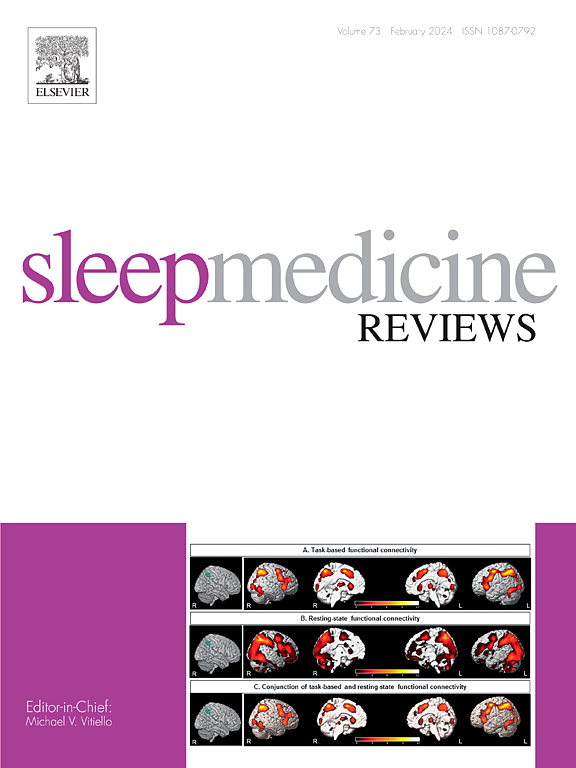Pharmacotherapy for obstructive sleep apnea: a critical review of randomized placebo-controlled trials
IF 9.7
1区 医学
Q1 CLINICAL NEUROLOGY
引用次数: 0
Abstract
Positive airway pressure therapy remains the gold standard treatment for obstructive sleep apnea (OSA), but challenges with adherence, acceptability, and side effects persist. Interest in pharmacological therapies has grown, culminating in the recent U.S. Food and Drug Administration approval of tirzepatide as the first pharmacotherapy for OSA. Our review critically examines the efficacy of pharmacologic treatments for OSA and highlights current limitations and future research directions.
We conducted a search of Medline and Embase for randomized controlled trials published from January 2005 to February 2025, identifying 41 studies investigating 37 different drugs or drug combinations.
Weight-loss therapies showed the most consistent and substantial improvements in OSA severity. Tirzepatide produced the largest reduction in apnea-hypopnea index and improved patient-reported outcomes and cardiometabolic risk factors. Other pharmacotherapies demonstrated modest and inconsistent effects on OSA severity, sometimes with side-effects that contradict the treatment goal to reduce daytime sleepiness.
Weight-loss agents, particularly tirzepatide, represent a promising and now clinically viable treatment option. While endotype-targeted approaches are conceptually attractive, many agents were too early in their testing/re-purposing phase to demonstrate improvements in sleepiness, quality of life or sustained reductions of OSA severity; or were insufficiently targeted at the endotype they might best treat.
阻塞性睡眠呼吸暂停的药物治疗:随机安慰剂对照试验的重要回顾。
气道正压治疗仍然是阻塞性睡眠呼吸暂停(OSA)的金标准治疗方法,但在依从性、可接受性和副作用方面仍然存在挑战。对药物治疗的兴趣越来越大,最近美国食品和药物管理局批准替西帕肽作为OSA的第一个药物治疗。我们的综述严格检查了OSA药物治疗的有效性,并强调了当前的局限性和未来的研究方向。我们在Medline和Embase检索了2005年1月至2025年2月发表的随机对照试验,确定了41项研究,调查了37种不同的药物或药物组合。减肥疗法在OSA严重程度上表现出最一致和最显著的改善。替西帕肽对呼吸暂停低通气指数的降低最大,并改善了患者报告的结果和心脏代谢危险因素。其他药物治疗对OSA严重程度的影响不大且不一致,有时其副作用与减少白天嗜睡的治疗目标相矛盾。减肥药,特别是替西帕肽,是一种很有前途的治疗选择,现在临床上是可行的。虽然内源性靶向方法在概念上很有吸引力,但许多药物在测试/重新利用阶段还为时过早,无法证明改善嗜睡、生活质量或持续降低OSA严重程度;或者没有充分靶向它们可能最好治疗的内源性肿瘤。
本文章由计算机程序翻译,如有差异,请以英文原文为准。
求助全文
约1分钟内获得全文
求助全文
来源期刊

Sleep Medicine Reviews
医学-临床神经学
CiteScore
20.10
自引率
3.80%
发文量
107
期刊介绍:
Sleep Medicine Reviews offers global coverage of sleep disorders, exploring their origins, diagnosis, treatment, and implications for related conditions at both individual and public health levels.
Articles comprehensively review clinical information from peer-reviewed journals across various disciplines in sleep medicine, encompassing pulmonology, psychiatry, psychology, physiology, otolaryngology, pediatrics, geriatrics, cardiology, dentistry, nursing, neurology, and general medicine.
The journal features narrative reviews, systematic reviews, and editorials addressing areas of controversy, debate, and future research within the field.
 求助内容:
求助内容: 应助结果提醒方式:
应助结果提醒方式:


